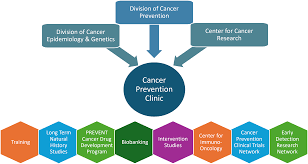Training course on Cancer Epidemiology and Control
Training Course on Cancer Epidemiology and Control training course is designed to equip healthcare professionals, researchers, and public health officials with the knowledge and skills necessary to understand cancer epidemiology and implement effective cancer control strategies.

Course Overview
Training Course on Cancer Epidemiology and Control
Training Course on Cancer Epidemiology and Control is designed to equip healthcare professionals, researchers, and public health officials with the knowledge and skills necessary to understand cancer epidemiology and implement effective cancer control strategies. Cancer remains a leading cause of morbidity and mortality worldwide, making it essential to address its prevention, early detection, and treatment.
Participants will explore the epidemiological principles related to cancer, including risk factors, screening, and prevention strategies. The course will emphasize evidence-based approaches to cancer control and the importance of community engagement. Through interactive workshops, case studies, and practical exercises, attendees will gain the tools necessary to develop and implement cancer control programs. By the end of the course, participants will be empowered to contribute to reducing the burden of cancer in their communities.
Course Objectives
- Understand the principles of cancer epidemiology and its significance in public health.
- Identify cancer risk factors and their implications for prevention.
- Develop effective cancer prevention and screening strategies.
- Explore evidence-based approaches to cancer treatment and management.
- Engage communities in cancer awareness and control efforts.
- Evaluate the effectiveness of cancer control programs.
- Foster collaboration among stakeholders in cancer prevention and control.
- Develop action plans for implementing cancer control strategies.
- Understand the role of health policies in cancer prevention and control.
- Promote the integration of mental health support in cancer care.
- Analyze the economic impact of cancer on healthcare systems.
- Foster cultural competence in cancer prevention strategies.
- Prepare for emerging trends in cancer epidemiology.
Target Audience
- Public health professionals
- Epidemiologists
- Healthcare providers
- Medical researchers
- Medical and nursing students
- Policy makers
- NGO representatives
- Oncologists
Course Duration: 5 Days
Course Modules
Module 1: Introduction to Cancer Epidemiology
- Overview of cancer epidemiology and its role in public health.
- Historical perspectives on cancer research and control.
- Types of cancer and their global burden.
- Key principles and methodologies in cancer epidemiology.
Module 2: Cancer Risk Factors
- Identifying modifiable and non-modifiable risk factors for cancer.
- Understanding the role of lifestyle factors (tobacco, diet, physical activity).
- Genetic predispositions and environmental exposures.
- Tools for assessing cancer risk in populations.
Module 3: Cancer Prevention Strategies
- Evidence-based approaches to cancer prevention.
- Developing community-based interventions for reducing cancer risk.
- Importance of vaccination (e.g., HPV vaccine) in cancer prevention.
- Role of public health campaigns in cancer awareness.
Module 4: Cancer Screening and Early Detection
- Overview of cancer screening guidelines and recommendations.
- Understanding the benefits and limitations of screening tests.
- Strategies for promoting screening in diverse populations.
- Evaluating the effectiveness of screening programs.
Module 5: Treatment and Management of Cancer
- Overview of cancer treatment modalities (surgery, chemotherapy, radiation).
- Importance of multidisciplinary approaches to cancer care.
- Palliative care and supportive services for cancer patients.
- Case studies of successful cancer treatment programs.
Module 6: Community Engagement in Cancer Control
- Importance of community involvement in cancer prevention efforts.
- Strategies for building partnerships with local organizations and stakeholders.
- Engaging key populations in cancer awareness and education.
- Evaluating community engagement initiatives.
Module 7: Evaluating Cancer Control Programs
- Importance of program evaluation in cancer control.
- Methods for assessing the effectiveness of cancer interventions.
- Developing evaluation frameworks and indicators.
- Communicating evaluation results to stakeholders.
Module 8: Action Planning and Implementation
- Developing personalized action plans for cancer control initiatives.
- Setting measurable goals and objectives.
- Identifying resources and support networks.
- Sharing action plans and receiving feedback.
- Creating a roadmap for implementation and sustainability.
Training Methodology
- Interactive Workshops: Facilitated discussions, group exercises, and problem-solving activities.
- Practical Demonstrations: Hands-on experience with cancer screening and prevention techniques.
- Case Studies: Real-world examples to illustrate effective cancer control practices.
- Role-Playing and Simulations: Practice decision-making in realistic public health scenarios.
- Expert Presentations: Insights from experienced cancer epidemiologists and public health leaders.
- Group Projects: Collaborative development of cancer prevention strategies for local communities.
- Action Planning: Development of personalized action plans for implementing learned practices.
- Digital Tools and Resources: Utilization of online platforms for tracking and reporting cancer initiatives.
- Peer-to-Peer Learning: Pairing experienced practitioners with those new to cancer control.
- Post-Training Support: Access to online forums, mentorship, and continued learning resources.
Register as a group from 3 participants for a Discount
Send us an email: info@datastatresearch.org or call +254724527104
Certification
Upon successful completion of this training, participants will be issued with a globally- recognized certificate.
Tailor-Made Course
We also offer tailor-made courses based on your needs.
Key Notes
- Participants must be conversant in English.
- Upon completion of training, participants will receive an Authorized Training Certificate.
- The course duration is flexible and can be modified to fit any number of days.
- Course fee includes facilitation, training materials, 2 coffee breaks, buffet lunch, and a Certificate upon successful completion.
- One-year post-training support, consultation, and coaching provided after the course.
- Payment should be made at least a week before the training commencement to DATASTAT CONSULTANCY LTD account, as indicated in the invoice, to enable better preparation.